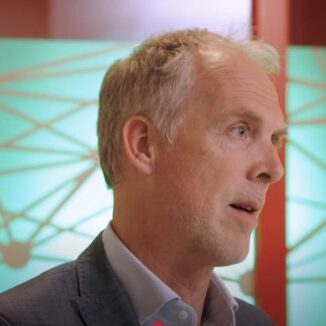Access to affordable energy for everyone, today and tomorrow
Discover the story of Alliander
In conversation with Koen Eising, Alliander
Alliander is a regional grid operator that builds and maintains the gas and electricity grid for energy used by households and businesses. CSR manager Koen Eising considers himself and his department as the social conscience of the company. In conversation with Julija Luzan, Director of Corporate & Institutional Banking at BNP Paribas, he explains what that means.
A network operator, you probably have an idea of what that is: a company responsible for the construction and maintenance of the gas and electricity network. Alliander does just that, but it strives to be more: it wants to be an integral part of society and look beyond its core tasks. ‘We call it broad prosperity,’ says Koen Eising.
‘Our goal is to provide everyone with access to affordable energy, now and in the future. Our stance is that our current prosperity must not come at the expense of future generations or other places in the world.” In fact, when it comes to broad prosperity, Alliander is ahead of other network operators.
It’s called ‘prosperity ethics’: asking tough questions and discussing moral dilemmas, such as ‘Which suppliers do you do business with when there are conflicting interests and how do you deal with that?’ and ‘What is the dark side of prosperity?’

Our goal is to provide everyone with access to affordable energy, now and in the future. Our stance is that our current prosperity must not come at the expense of future generations or other places in the world.
Koen eising, CSR-manager Alliander
Period of congestion
The delivery of energy is something most of us take for granted – it seems self-evident.. However, that self-evident quality has its limits. Increased use of electric cars and heat pumps lead directly to increased demand for electricity
At the same time, increased use of renewable energy from solar and wind sources leads to increased fluctuation in energy supply. At one moment the energy supply is huge at another there’s little to go around. We are in a period of congestion. If we don’t solve this, it will have consequences for everyone, because it will mean that homes and businesses can’t be connected to the grid.”
Congestion also will also lead to a delay in achieving climate targets and making the entire energy system more sustainable.
Large customers who want to switch to electric power or connect solar parks in particular are experiencing delays in reaching their sustainability ambitions.
Matching supply and demand
Alliander used to focus solely on the construction and maintenance of the power grid. How does the company approach matching supply and demand? “What we are doing more and more, is to enter into discussions with those large customers of ours.
This way we can match supply and demand at local level and reduce pressure on the energy grid. Expanding the infrastructure – putting more cables into the ground– is a first requirement, but there are two other important directions for solutions: making better use of existing infrastructure and reducing energy demand. The latter, in particular, is new for Alliander and also a very complex problem. How do you change people’s behavior? As humans, we have grown used to having energy available at any given time of the day. And we want to keep our current levels of comfort, whether it’s charging the car or turning on the washing machine.
The natural world, on the other hand, simply works with the energy that is available.
Someone once said: man is a wrong-way driver in the ecosystem. And that’s the truth.” The problem can be partly solved with technology, but to a large extent it requires a change in behavior. According to Koen Eising, Alliander plays a role in stimulating this.
Cooperation with governments and contractors
Alliander works together with municipalities, provinces and the national government.
Not only “to raise energy awareness to a higher level,” but also on what Koen Eising calls ‘energy planology’.
Previously, a municipality made a plan, and the network operator subsequently built the necessary infrastructure. These days, there is a lot more consultation. For example, when a municipality or province is dealing with the arrival of a company with a large energy need.
In these cases, Alliander and the municipality or province now collaborate to determine the best location for such a company.
Additonally, Alliander has introduced new kinds of contracts to create space on the grid, and there is more consultation with contractors on ways to organize the construction of infrastructure faster, more easily and more efficiently.
Climate-neutral and social business operations
Alliander has had a broad program for corporate social responsibility since 2010 and is working towards climate-neutral business operation. We want to deal efficiently with our raw materials. We are working on a biodiversity plan. And we are already doing a great deal in greening our outdoor spaces.” In addition, the company is focused on its social impact. The number of women in leadership positions has grown from 8% to 33% and hard work is being done on inclusion to do justice to the multicultural society.
Energy poverty and human rights are two societal issues that are high on the agenda at Alliander. The company works closely with the city of Amsterdam to prevent vulnerable households that are unable to pay their energy bills from being disconnected from the grid. “By linking the city government’s information to the consumption data, we ensure that those households do not get into even more trouble.” Alliander is also increasingly involved in a human rights approach to the energy supply chain: “Where do all the raw materials, cables and transformers that we purchase come from? We want to know more about that.”

Joined forces for cleaner energy
The societal and infrastructural objectives of Alliander require the necessary financial capital. But with which bank or banks are you going to partner? For Alliander, BNP Paribas came directly to mind. That in itself is not strange when you consider that the bank has ambitious goals when it comes to solutions for the energy transition.
Julija Luzan, Director Corporate & Institutional Banking: “We can play a crucial role here by using our network and connecting the right parties with each other. Our goal is to invest 90% of our loans in the energy sector into clean energy.
The first challenge for Alliander, the expansion of its infrastructure, is a matter of financing. The bank offers solutions for this in the form of green loans, green bonds and other green financing instruments. BNP Paribas also provides support for the other two challenges mentioned by Koen Eising – better use of the network and changing energy-usage behavior – as in the case of Alliander’s own electric vehicle fleet and the setup of a comprehensive mobility plan aimed at fewer cars and more public transport and cycling.
But there are many more possibilities for cooperation: “Our people from Real Estate could, for example, investigate together with Alliander how we can make existing buildings greener. BNP Paribas Asset Management can provide support for investing pension capital in funds that seamlessly match Alliander’s sustainability strategy.
And together we could translate that strategy into KPIs for measuring the performance of suppliers. The energy transition requires a contribution from all of us.
The collaboration between Alliander and BNP Paribas demonstrates that by pooling our strengths, we can work on a path to cleaner energy distribution.

Read the other stories of frontrunners in the Netherlands.
Check out how we collaborate with partners and clients in our international network.